Bruce Adamson | |
|---|---|
 | |
| Education | Victoria University of Wellington |
Bruce Adamson has been the Children and Young People's Commissioner Scotland since 2017.
Bruce Adamson | |
|---|---|
 | |
| Education | Victoria University of Wellington |
Bruce Adamson has been the Children and Young People's Commissioner Scotland since 2017.
Adamson was originally from Palmerston North, New Zealand. [1] He attended Palmerston North Boys' High School. [2] At the Victoria University of Wellington he gained a Bachelor of Arts (majoring in History) and a Bachelor of Laws. [3]
Adamson practised in the family and criminal courts in New Zealand before moving to Scotland in 2002.
Adamson was part of the team when the Scotland's Commissioner for Children and Young People was set up in 2005. [2]
He was a legal officer at the Scottish Human Rights Commission. [4] and has worked as a member of Children's Panels. [5]
In 2013 he was seconded to a position in Geneva with the Global Alliance of National Human Rights Institutions. [6] representing institutions from over 100 countries working to improve human rights across the world. [7]
On 14 March 2017, Parliament approved his nomination. [8]
Adamson has spoken in support of a ban of smacking [9] and the raising of the age of criminal responsibility. [10]

The International Criminal Court is an intergovernmental organization and international tribunal seated in The Hague, Netherlands. It is the first and only permanent international court with jurisdiction to prosecute individuals for the international crimes of genocide, crimes against humanity, war crimes and the crime of aggression.
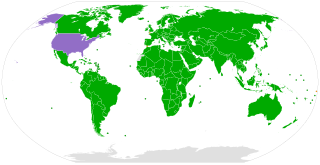
The United Nations Convention on the Rights of the Child is an international human rights treaty which sets out the civil, political, economic, social, health and cultural rights of children. The convention defines a child as any human being under the age of eighteen, unless the age of majority is attained earlier under national legislation.

Crimes against humanity are widespread or systemic criminal acts which are committed by or on behalf of a de facto authority, usually by or on behalf of a state, that grossly violate human rights. Unlike war crimes, crimes against humanity do not have to take place within the context of wars, and they apply to widespread practices rather than acts which are committed by individuals. Although crimes against humanity apply to acts which are committed by or on behalf of authorities, they do not need to be part of an official policy, and they only need to be tolerated by authorities. The first prosecution for crimes against humanity took place during the Nuremberg trials. Initially considered for legal use, widely in international law, following the Holocaust, a global standard of human rights was articulated in the Universal Declaration of Human Rights (1948). Political groups or states that violate or incite violations of human rights norms, as they are listed in the Declaration, are expressions of the political pathologies which are associated with crimes against humanity.
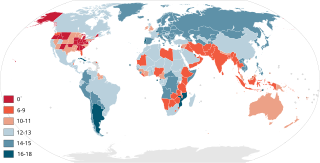
The age of criminal responsibility is the age below which a child is deemed incapable of having committed a criminal offence. In legal terms, it is referred to as a defence/defense of infancy, which is a form of defense known as an excuse so that defendants falling within the definition of an "infant" are excluded from criminal liability for their actions, if at the relevant time, they had not reached an age of criminal responsibility. After reaching the initial age, there may be levels of responsibility dictated by age and the type of offense committed.

International criminal law (ICL) is a body of public international law designed to prohibit certain categories of conduct commonly viewed as serious atrocities and to make perpetrators of such conduct criminally accountable for their perpetration. The core crimes under international law are genocide, war crimes, crimes against humanity, and the crime of aggression.

Lyal S. Sunga is a well-known specialist on international human rights law, international humanitarian law and international criminal law.
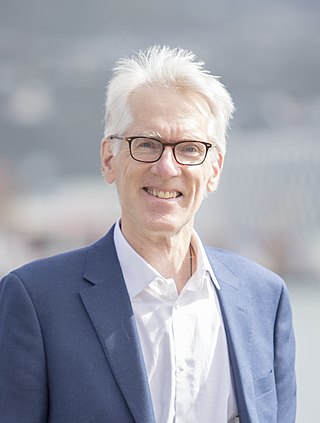
Paul Hunt, a New Zealand and British national, is a human rights expert who specialises in economic, social and cultural rights. In January 2019, he took up office as Chief Commissioner at the New Zealand Human Rights Commission.

In the practice of international law, Command responsibility is the legal doctrine of hierarchical accountability for war crimes, whereby a commanding officer (military) and a superior officer (civil) is legally responsible for the war crimes and the crimes against humanity committed by his subordinates; thus, a commanding officer always is accountable for the acts of commission and the acts of omission of his soldiers.
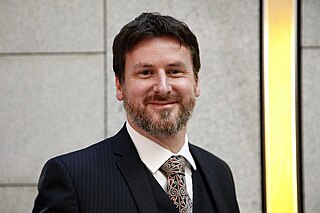
The Children and Young People's Commissioner Scotland is a post in Scotland whose main task is to promote and safeguard the rights of children and young people. The position, equivalent to the Children's Ombudsman agencies of many other countries, was established by the Commissioner for Children and Young People (Scotland) Act 2003. The current Commissioner is Bruce Adamson.

The Crimes Amendment Act 2007 is an amendment to New Zealand's Crimes Act 1961 which removed the legal defence of "reasonable force" for parents prosecuted for assault on their children.
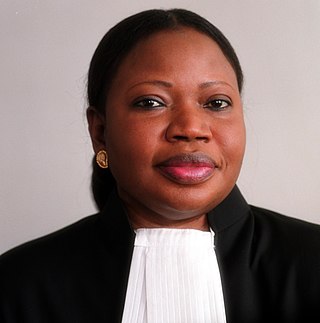
Fatou Bom Bensouda is a Gambian lawyer and former Prosecutor of the International Criminal Court (ICC), who has served as the Gambian High Commissioner to the United Kingdom since 3 August 2022.

An ombudsman, ombud, ombuds, ombudswoman, ombudsperson or public advocate is an official who is usually appointed by the government or by parliament to investigate complaints and attempt to resolve them, usually through recommendations or mediation.

The Children's Commissioner Act 2003 is an Act of the New Zealand Parliament. It reformed the office of the Children's Commissioner as the Office of the Children's Commissioner (OCC) and implemented the United Nations Convention on the Rights of the Child, which is attached as Schedule 2 of the Act. In August 2022, the Children's Commissioner Act was repealed by the Children and Young People's Commission Act 2022, which established the Children and Young People's Commission.
A children's ombudsman, children's commissioner, youth commissioner, child advocate, children's commission, youth ombudsman or equivalent body is a public authority in various countries charged with the protection and promotion of the rights of children and young people, either in society at large, or in specific categories such as children in contact with the care system. The agencies usually have a substantial degree of independence from the executive, the term is often used differently from the original meaning of ombudsman, it is often an umbrella term, often used as a translation covention or national human rights institutions, dealing with individual complaints, intervening with other public authorities, conducting research, and – where their mandate permits them to engage in advocacy – generally promoting children's rights in public policy, law and practice. The first children's commissioner was established in Norway in 1981. The creation of such institutions has been promoted by the United Nations Committee on the Rights of the Child, and, from 1990 onwards, by the Council of Europe.

John Hall Angus was a New Zealand historian, social worker and children's advocate. He served as the New Zealand Children's Commissioner between 2009 and 2011.

Intersex rights in New Zealand are protections and rights afforded to intersex people. Protection from discrimination is implied by the Human Rights Act and the Bill of Rights Act, but remains untested. The New Zealand Human Rights Commission states that there has seemingly been a "lack of political will to address issues involved in current practices of genital normalisation on intersex children".
The legality of corporal punishment of children varies by country. Corporal punishment of minor children by parents or adult guardians, which is intended to cause physical pain, has been traditionally legal in nearly all countries unless explicitly outlawed. According to a 2014 estimate by Human Rights Watch, "Ninety percent of the world's children live in countries where corporal punishment and other physical violence against children is still legal". Many countries' laws provide for a defence of "reasonable chastisement" against charges of assault and other crimes for parents using corporal punishment. This defence is ultimately derived from English law. As of 2023, only three of seven G7 members including seven of the 20 G20 member states have banned the use of corporal punishment against children.
Andrew Clapham is a British international lawyer specializing in human rights, international courts and tribunals and international humanitarian law. He has served in various advisory capacities at the United Nations.
Solome Balungi Bossa, , is a Ugandan judge on the International Criminal Court (ICC). Prior to her election to the ICC, she was a member of the Court of Appeal in Uganda, which also doubles as the Constitutional Court in the Judiciary of Uganda. She was elected to a nine-year term on 5 December 2017 and was sworn in on 9 March 2018. Previously she was appointed to a six-year term on the African Court on Human and Peoples' Rights in 2014.

Basic human rights in Italy includes freedom of belief and faith, the right of asylum from undemocratic countries, the right to work, and the right of dignity and equality before the law. Human rights are the basic rights of every citizen in every country. In Italy, human rights have developed over many years and Italy has education on human rights. In addition, Italy has specific human rights for women, children and LGBT people. There are some organizations that support human rights in Italy.